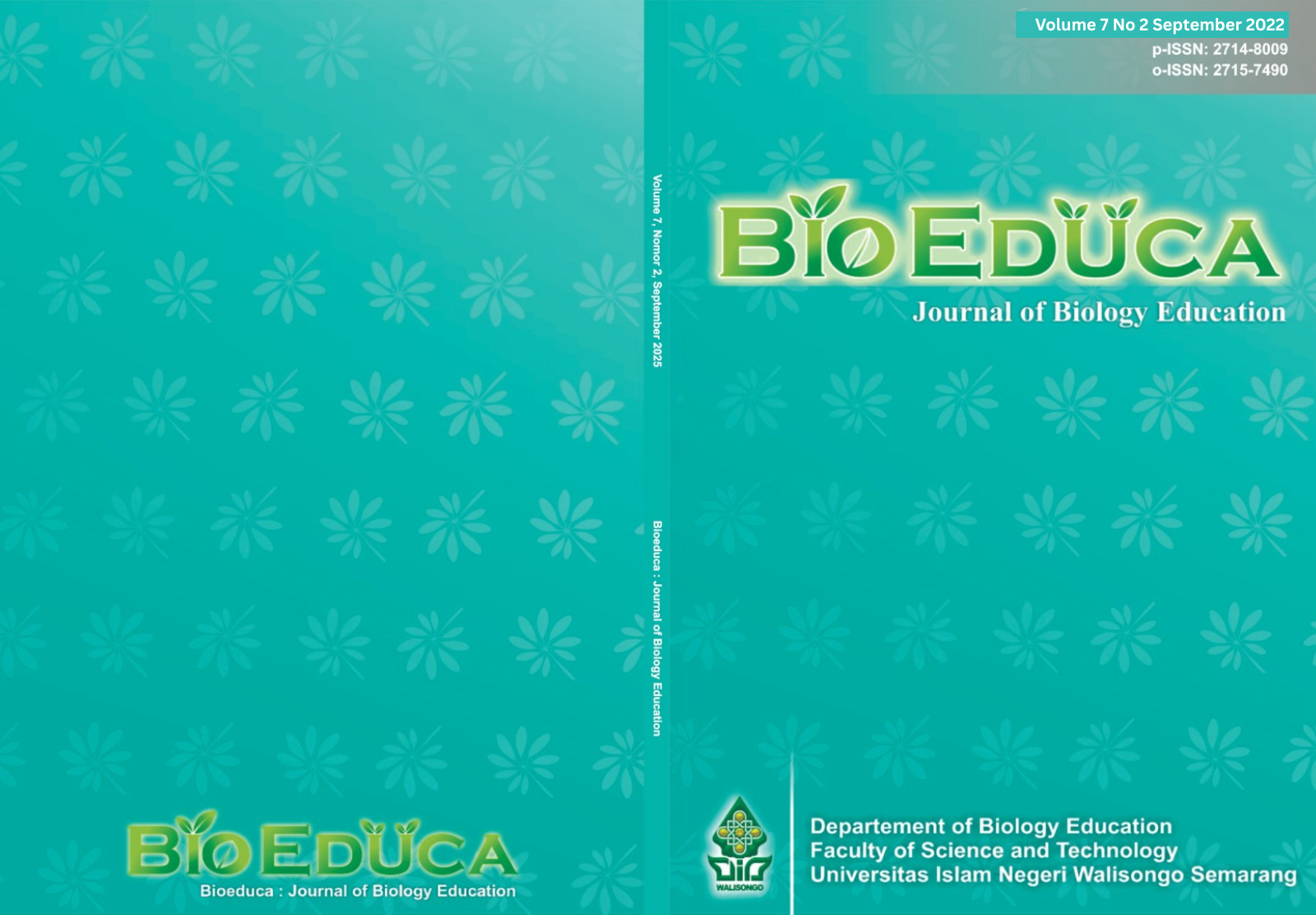Pengaruh Model Pembelajaran Berbasis Pendekatan Saintifik dengan Real object dan ICT terhadap Literasi Biologi Siswa
Main Article Content
Abstract
Penelitian ini bertujuan untuk mengetahui pengaruh penggunaan model pembelajaran berbasis pendekatan saintifik dengan real object dan ICT terhadap peningkatan literasi biologi peserta didik. Penelitian ini adalah quasi experiment dengan pre & posttest group design. Teknik pengumpulan data dengan pretest-posttest dan observasi. Hasilnya diketahui bahwa dengan penggunaan real object dan ICT (blended) terdapat pengaruh pada peningkatan literasi biologi siswa dalam kategori sedang (g: 0,3). Hal ini dibuktikan dengan peningkatan rata-rata nilai sebesar 11,5%. Berdasarkan hasil uji Kruskal-Wallis didapatkan nilai Asymp. Sig. 0,002<0,05 yang berarti hipotesis diterima. Maka dapat disimpulkan bahwa terdapat pengaruh penggunaan model pembelajaran berbasis pendekatan saintifik dengan real object dan ICT terhadap literasi biologi siswa.
Downloads
Article Details
The copyright of the received article shall be assigned to the journal as the publisher of the journal. The intended copyright includes the right to publish the article in various forms (including reprints). The journal maintains the publishing rights to the published articles. Authors are allowed to use their articles for any legal purposes deemed necessary without written permission from the journal with an acknowledgment of initial publication to this journal.

This work is licensed under a Creative Commons Attribution-ShareAlike 4.0 International License.
References
Anakara, H. (2021). Assessment of Biological Literacy Levels Among Third-Grade Secondary School Students in Medina. International Education Studies. 14(7), 47-58. doi:10.5539/ies.v14n7p47
Barringer, A. (2010). Method in teaching English as second language learning. Holland: Prallert Mass Public.
Bawa, N. and Imam, H. Y. (2020). Realia and Its Relevance in the 21st Century Learning. International Journal of Applied Research and Technology. 9(9), 52 – 56.
Boulden, D. Hurt, June W; and Richard, Mary Kathleen. (2017). Implementing Digital Tools to Support Student Questioning Abilities: A Collaborative Action Research Report. Journal Inquiry in Education. 9(1), 1-14.
Degeng, I. (1993). Media Pendidikan. Malang: FIP IKIP Malang.
Howland, J., dan Marra. (2012). Meaningful Learning with Technology. Boston: Pearson.
Juhji. (2016). Peningkatan Keterampilan Proses Sains Siswa Melalui Pendekatan Inkuiri Terbimbing. Jurnal Penelitian dan Pembelajaran IPA. 2(1), 58-70.
Juma, Z. (2015). Exploring the Development of Biological Literacy in Tanzanian Junior Secondary School Students. Tesis tidak dipublikasikan. Wellington: Victoria University of Wellington.
Kasim, U., Teuku Z., Nasriati. (2017). Classroom Practice: Applying the Scientific Approach Based on the 2013 Curriculum. English Education Journal. 8(4), 518-535.
Kemdikbud, (2013). Pengembangan Kurikulum 2013. Jakarta: Kemdikbud.
Kola, J. A. (2013). Effective Teaching and Learning in Science Education through Information and Communication Technology [ICT]. IOSR Journal of Research & Method in Education (IOSR JRME). 2(5), 43-47.
Loi, Massimo & Berge, Ola. (2015). Assessing the Effects of ICT on Learning Outcomes. 10.13140/RG.2.1.4472.2648.
Mahmudah, L. (2016). Pentingnya Pendekatan Keterampilan Proses pada Pembelajaran IPA di Madrasah. Jurnal Elementary. 4(1). http://dx.doi.org/10.21043/elementary.v4i1.2047.
OECD. (1999). Measuring Student Knowledge and Skills. Diakses tanggal 20 April 2019 dari http://www.oecd.org/edu/school/programmeforinternational studentassessmentpisa/33693997.pdf
Oktafiani, R. O., Retnoningsih, A., & Widiatiningrum, T. (2022). Pengembangan E-Book Interaktif Tumbuhan Berbiji dengan Pendekatan Saintifik dan Kontekstual. Bioeduca: Journal of Biology Education, 4(1), 67-83.
Schleicher, A. (2019). PISA 2018: Insight and Interpretation. Paris: OECD.
Potyrala, K. (2003). ICT Tools in Biology Education. Cracow: University of Cracow.
Rezba, R. J. (2007). Learning and Assessing Science Process Skills. Iowa: Kendall/Hunt.
Rusijono, A. F. (2018). The Effect of Scientific Approach towards Students Activity and Learning Outcomes. Advances in Social Science, Education and Humanities Research. 212(1), 371-376.
Semilarski, H. and Anne Laius. (2021). Exploring Biological Literacy: A Systematic Literature Review of Biological Literacy. European Journal of Educational Research. 10(1), 1181-1197 DOI: https://doi.org/10.12973/eu-jer.10.3.1181.
Sufairoh. (2016). Pendekatan Saintifik dan Model Pembelajaran K-13. Jurnal Pendidikan Profesional. 5(3), 116-125.
Sundayana, R. (2014). Statistika Penelitian Pendidikan. Bandung: Alfabeta.
Suwono, H., Pratiwi, H., Susanto, H., & Susilo, H. (2017). Enhancement of Students’ Biological Literacy and Critical Thinking of Biology through Socio-Biological Case-Based Learning. Jurnal Pendidikan IPA Indonesia, 6(2), 213-220. doi:https://doi.org/10.15294/jpii.v6i2.9622
Suyanto, Suratsih, & Yuni W. (2018). Penerapan Model Pembelajaran Berbasis Pendekatan Saintifik dengan Real objects untuk Meningkatkan Proses Sains dan Hasil Belajar. Laporan penelitian. Universitas Negeri Yogyakarta.
Wei W., dan Xia Wu. (2016). The Improvement of Students Scientific Literacy based on Biology Concept Teaching. Prosiding. The 2016 4th International Education, Economics, Social Science, Arts, Sports and Management Engineering, tanggal 13-14 Agustus 2016. Yinchuan: Atlantis Press.

